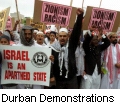NGO Monitors Submission to the 2009 Durban Conference Preparatory Meeting
Abstract

As NGO Monitor reported, in November 2006, the UN General Assembly adopted a resolution to convene a 2009 follow-up to the 2001 World Conference Against Racism held in Durban, South Africa. The Preparatory Committee (“Prepcom”) for the 2009 conference is holding its organizational review session from August 27-31, 2007, in Geneva. The meetings will be chaired by Libya, well-known for its dismal human rights record. Other members of the committee include Iran, Cuba, Russia, and South Africa. A number of international and Palestinian NGOs are also expected to participate. Many radical Palestinian NGOs such as PNGO and LAW played an active role in the preparatory meetings in Tehran (from which Jewish and Israeli participants were barred) leading up to the 2001 Durban Conference and were largely responsible for shaping the anti-Israel and antisemitic agenda of the NGO Forum at Durban.
In advance of the Prepcom, the Office of the High Commissioner for Human Rights has invited NGOs to contribute “reviews” and “written recommendations.” To that end, NGO Monitor has prepared a submission detailing the role of NGOs at the 2001 Durban Conference, the adoption and subsequent promotion of the “Durban Strategy” in NGO campaigning, and offering recommendations to prevent a repetition of these events in 2009.
Submission to the UN Preparatory Committee for the Durban Review Conference
NGO Monitor hereby presents this submission to the UN Preparatory Committee for the Durban Review Conference (“Prepcom”) in advance of its organizational review session on 27-31 August 2007. Our submission presents a detailed analysis of the distortions and conflict-enhancing impacts that result from the involvement of politicized NGOs in such activities. Although these NGOs claim to promote universal human rights, the record shows that in reality, they advance biased agendas based on a highly distorted narrative that exploit and undermine international law. Several of these NGOs, including PNGO, Miftah, Ittijah, Human Rights Watch, and Amnesty International played an active role in the NGO Forum of the 2001 Durban Conference and preparatory meeting in Iran. Rather than provide objective information to address the crucial issue of eliminating discrimination in all its forms, and through universal standards, many statements of these NGOs and their activities during the 2001 NGO Forum included highly inflammatory rhetoric and even anti-Semitic material, such as comparing the State of Israel to Nazi Germany. The Final Declaration of the NGO Forum endorsed the singling-out of Israel through a campaign that called for sanctions and boycotts against Israel through the abuse of the principles of human rights and international law.
Given the impact of the Prepcom’s reports and activities, it is important that they be credible, accurate and impartial. NGO Monitor’s systematic and detailed analyses demonstrate that the submissions of political NGOs regarding alleged discriminatory practices and other human rights issues lack credibility in the context of conflicts involving terrorism and warfare. The obsessive condemnations of Israeli responses to Hezbollah attacks during the 2006 conflict, and the clear inaccuracies and reliance on unverifiable sources in the numerous reports issued by NGOs, including Human Rights Watch and Amnesty International, further highlights this issue. We also note a recent study conducted by the Conflict Analysis Resource Center in Colombia, shows the lack of reliability of NGO reporting (HRW and Amnesty) in this conflict. On this basis, we urge the Prepcom to carefully examine the credibility and biases resulting from the participation of political NGOs in order to avoid a repetition of the results of the 2001 Durban conference.
NGO Monitor’s submission is organized as follows:
I. NGO Monitor’s Mission Statement
II. The “NGO Information Chain”
III. The NGO Forum of the Durban Conference and the “Durban Strategy”
IV. NGO Implementation of the Durban Strategy (detailed analysis of specific NGOs)
V. Conclusion and Recommendation
Respectfully Submitted,
Prof. Gerald Steinberg
NGO Monitor
cc: The Honorable Louise Arbour, UN High Commissioner for Human Rights
To read NGO Monitor’s Submission in its entirety, click here (PDF)
